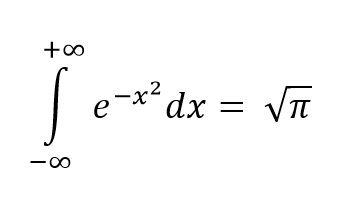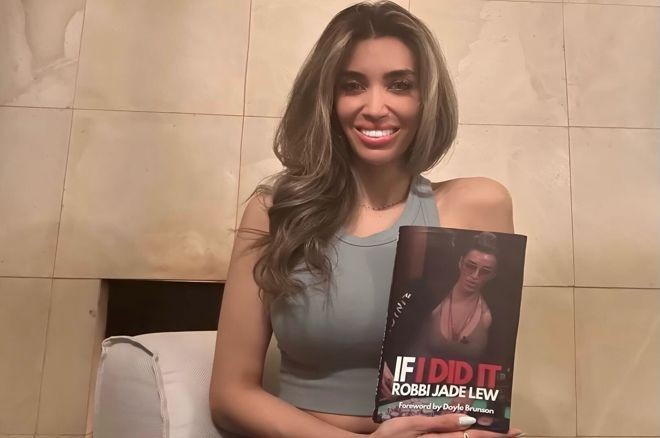Garrett Adelstein vs. Robbi Jade Lew (part 2)
Before I get to the main topic, let me wish all my newsletter readers a blessed pi day! Pi day is the one day a year when the world comes together in unity to celebrate the beauty, elegance and mystery of not just pi, but all of mathematics! Below is one of my favorite equations, that not only combines e and π, but the left side shows the density function of the Gaussian curve. If this doesn’t show there is design and order in the universe, then what does?

In this newsletter, we continue the examination of an infamous poker hand involving Garrett Adelstein and Robbi Jade. You may recall part 1 appeared in the February 8, 2024 newsletter.
One of the main arguments of those on Adelstein’s side is that Jade returned the money in question, which would seem to imply guilt. Why would an innocent person return the money? In this second part in the story, guest writer Rigondeaux examines and rebuts this argument. Rigondeaux is a Wizard of Vegas forum member. He can be reached by private message there if you wish to reach him, including inquiries as a gambling writer for hire.

The Case Against Robbi
Why did she return the money?
Many people who lean guilty, and even some who lean innocent, believe that the return of the money is compelling evidence of guilt. They are wrong.
The thinking is something like, “I would never return the money in this situation if I were innocent. I would stand my ground. I think anyone else would behave similarly.”
One problem with this argument is it applies equally well to a cheater. Many people have been caught cheating in poker. How often have they returned the money? Even if it were true that it would be unusual for an innocent person to return the money, it would also be unusual for a guilty person to return it. Therefore, returning the money does not make guilt or innocence much more likely.
Perhaps a bigger problem with this argument is that it is objectively wrong. We have examples of players returning significant money in similar situations.
Here is a video of comedian Kevin Hart returning 15,000 British pounds because he won due to misreading his hand. Hart’s opponent was bluffing. Hart called, believing he had a straight. He did not have a straight, but won anyway with king high. Nit pickers can find differences between the two hands, but they are uncannily similar. A lot of money is involved, but these people can afford it. Hart is an amateur poker player with other sources of money. He is not a cutthroat pro. So when he won by making a blunder, he felt guilty and returned the money. This proves, beyond a shadow of a doubt, that sometimes a poker player will return winnings in a large pot, even if they have done nothing unethical or illegal. You can’t say it’s “impossible” because this is a video of it happening. (I don’t know of any videos of cheaters returning money when asked.)
More generally, the “I would never return the money...” argument misunderstands human nature. At the extreme, there are examples of people confessing to first degree murder, knowing they are innocent. You can read all about it here, but basically they crack under pressure from authorities. If someone will knowingly give a false confession to first degree murder, it stands to reason that they will capitulate in lower stakes situations.
People putting forward the “I’d never return the money” argument are naive about human nature in general, and likely underestimate their own propensity to crack. We don’t need academics to tell us people can be talked into buying cars or houses they know they shouldn’t buy by good salespeople, or that they can feel intimidated outside their element and capitulate to authority. Why do timeshare companies offer free show tickets to people who sit through their sales pitches? Because people fork over large amounts of money when they shouldn’t all the time! Especially when they are put under pressure, outside their element and perhaps feel a bit of guilt/obligation over having accepted a valuable gift.
In fact, the owner of HCL is Nick Vertucci. He made his fortune by selling real estate seminars of questionable value for tens of thousands of dollars. Complaints to the BBB and elsewhere suggest that people were pressured into making bad financial decisions. If people couldn’t be pressured or manipulated into handing over tens of thousands of dollars when they shouldn’t, HCL wouldn’t exist and the hand would never have happened!
We don’t know much about the return of the J4 money, as it was off screen. In fact, we don’t know that Robbi was even accused of cheating. She might not have even realized that she was suspected of cheating. What we do know was that an amateur woman was taken into a private area and confronted by the producer of the show and Garrett, a body builder and very famous poker pro.
We know that Ryan, the show’s producer, reportedly warned Robbi that the video would go viral and be seen by millions. Implicit in that is the potential for a lot of misery. It’s the 2020s and we all know about the severity of online harrasment and that it has driven some to suicide. While those are the most extreme cases, becoming a villain on social media is a terrible experience that most people would very much want to avoid.
We know that Garrett reportedly said “you know you f----ed up.”
It sounds as if Robbi then offered to return the money, perhaps without being asked. There are a number of plausible explanations that could factor into this. Like Kevin Hart, she won by making an error and felt she didn’t deserve the money. She was an uncertain amateur and simply capitulated to the experts/authorities. She was intimidated by some combination of disparate status, and physical/gender related discomfort. Perhaps she does not like confrontation and would rather “lose” than have a major dispute. The money wasn’t that important to her, partly because it was gambling money she’d just won luckily and could have just as easily lost. She was afraid of being a social media villain.
I actually find it quite easy to imagine myself acting similarly, even as a confident, semi-pro poker player, rather than an amateur. I’m in a home game. I win a crazy, confusing pot, perhaps by misreading my hand. The loser of the pot is deeply upset. The host of the game takes us aside and suggests that I’m damaging my reputation by keeping my winnings. The money is an amount I care about, but will hardly make or break me. I might prefer returning the money and getting back to playing, rather than having a huge argument about the pot and dealing with people smearing my name.
It’s really not that hard to understand. Yet I’ve found people to be very stubborn on this point. All I can do is reiterate that 1) It can’t be impossible if there is an authentic video of it happening. 2) There is no evidence for the implied claim that cheaters readily return money when asked. 3) Your ability to “just know” how people behave loses to volumes of expert studies with empirical evidence showing you are wrong.
Part 3 will probably appear in the March 21, 2024 newsletter.




